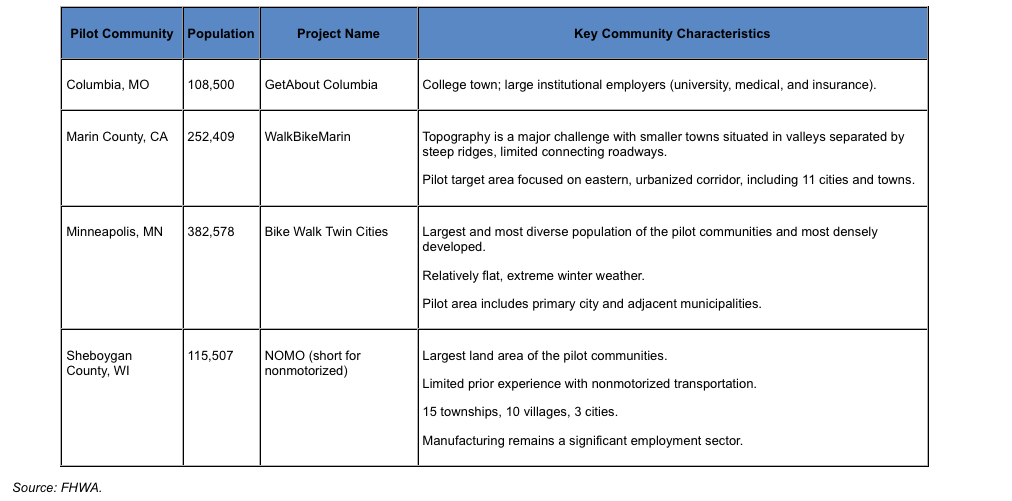FEDERAL HIGHWAY ADMINISTRATION: PUBLIC ROADS
Four pilot communities evaluated the effectiveness of investing Federal funds in nonmotorized transportation. The results are encouraging.
What happens when a community focuses its resources and attention on walking and bicycling by increasing Federal investments in nonmotorized transportation?
Proportionately, Federal funding for bicycling and walking lags significantly behind financial support for other transportation modes, as shown in a recent study funded by the Centers for Disease Control and Prevention. The study, Bicycling and Walking in the United States: 2012 Benchmarking Report, found that although bicycling and walking make up 12 percent of all trips and account for 14 percent of traffic fatalities, only 1.6 percent of Federal transportation funding goes to these modes.
To find out what happens as a result of increased investment in walking and bicycling, the U.S. Congress established the Nonmotorized Transportation Pilot Program (NTPP) in August 2005, as Section 1807 of the Safe, Accountable, Flexible, Efficient Transportation Equity Act: A Legacy for Users (SAFETEA-LU).
Over the following 4 years, the NTPP provided a total of more than $25 million annually in contract authority to four pilot communities (approximately $6.25 million to each community): Columbia, MO; Marin County, CA; Minneapolis, MN; and Sheboygan County, WI. The pilot communities represent a diverse cross section of U.S. cities and towns in terms of population size, demographic profiles, location, physical characteristics, climate, and need for nonmotorized transportation. Each community implemented locally devised strategies to increase the use of nonmotorized transportation and document any accompanying safety, environmental, and health benefits.
Since the beginning of the program, the Federal Highway Administration (FHWA) and the pilot communities have examined the impacts of the investments and continue to do so as more projects are completed. A working group established by NTPP estimates, based on traffic counts and studies, that bicycling as a mode share of transportation increased 36 percent across all four communities between 2007 and 2010, walking increased 14 percent, and driving decreased 3 percent.
According to Steve Kinsey, president of the Marin County Board of Supervisors, “This program and its legacy will change the face of transportation in communities across the country.”
The Four Pilot Communities
Evaluating the Pilot Program
As described in SAFETEA-LU, the purpose of the NTPP is “to demonstrate the extent to which bicycling and walking can carry a significant part of the transportation load, and represent a major portion of the transportation solution, within selected communities.”
The legislation also calls for the U.S. Secretary of Transportation to “develop statistical information on changes in motor vehicle, nonmotorized transportation, and public transportation usage in communities participating in the program and assess how such changes decrease congestion and energy usage, increase the frequency of bicycling and walking, and promote better health and a cleaner environment.”
From the beginning, the NTPP’s working group designed the demonstration program to gather statistical information on shifts in transportation mode share, both before and after the implementation of nonmotorized infrastructure and educational efforts. To assess the impacts of the NTPP, the enabling legislation calls for interim and final reports to be submitted to Congress. The NTPP’s working group tendered the interim report on January 9, 2008. The final report was submitted to Congress in April 2012. Various projects funded by the NTPP are being constructed during the summer of 2012, and results will be tracked in the fall. After completion, the pilot communities will issue a report to the public.
Planned and Completed Capital Projects
Read full report here: Walking and Bicycling Pay Off
About The Federal Highway Administration (FHWA)
www.fhwa.dot.gov
“The Federal Highway Administration (FHWA) is an agency within the U.S. Department of Transportation that supports State and local governments in the design, construction, and maintenance of the Nation’s highway system (Federal Aid Highway Program) and various federally and tribal owned lands (Federal Lands Highway Program). Through financial and technical assistance to State and local governments, the Federal Highway Administration is responsible for ensuring that America’s roads and highways continue to be among the safest and most technologically sound in the world.”
Tags: Bicycling, Economy, Federal Highway Administration, Walking








 RSS Feed
RSS Feed